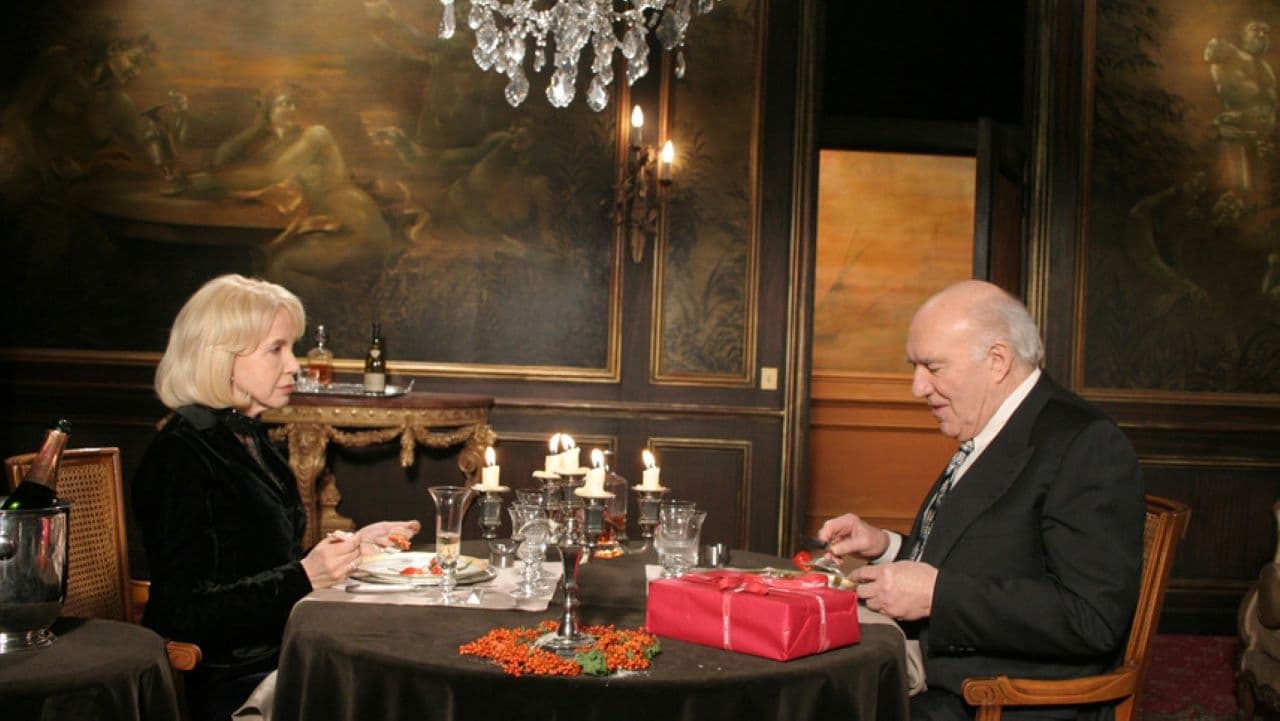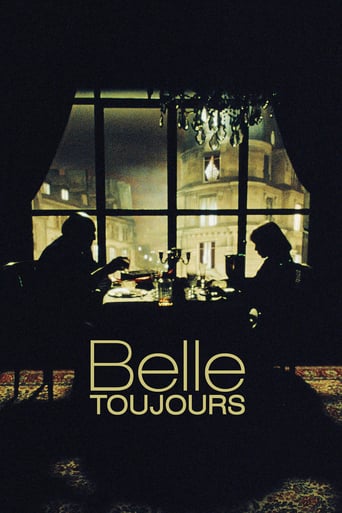

Dreadfully Boring
... View MoreI cannot think of one single thing that I would change about this film. The acting is incomparable, the directing deft, and the writing poignantly brilliant.
... View MoreClose shines in drama with strong language, adult themes.
... View MoreIf you like to be scared, if you like to laugh, and if you like to learn a thing or two at the movies, this absolutely cannot be missed.
... View MoreFirst: slow down. Second: turn of the phone. Third: relax. Now you're ready for a treat. Manoel de Oliveira's Belle Toujours (2006) is a sequel in homage to Belle de Jour (1967), the classic film from Luis Buñuel and Jean-Claude Carrière. Certainly Belle Toujours is diverting and can stand alone; but, when it follows on the heels of Belle de Jour, so that the two films are taken together, then it finds its full stride. Something magical happens. Michel Piccoli returns as "Mr. Husson" (un drôle de type), as Bulle Ogier replaces - who else could? - the otherwise irreplaceable Catherine Deneuve as "Séverine" (la putain-penitent, forty years on). It works very well. Alone, Oliveira's little gem comes in around 60 minutes. If watched immediately after Buñuel's film, the two taken together require 2 hours and 40 minutes. Enjoy. 8/10 plays it safe.
... View MoreOur film festival in Vancouver keeps bringing his films (which I have sat through a few and never been impressed), so he must be a critic's darling, but this is terribly dull.I agree completely with Moustache review. Someone else suggested Elegant, but Decadent might be closer to the mark. What does an old man make a film about? An old man, of course! Not that an old man can't be interesting of course, but he seems to have nothing to say that I can decipher. There's certainly no fire in the belly, candles burning out would be closer! The female lead is completely successful, but I can certainly see why Catherine Deneuve would have given this a pass! Edward Dardis Van BC
... View Moreevery minute of this film felt like an hour. I liked two things about the film - those were the shots of Paris, including some of the pretentious ones. Every scene was very dull and the actors really could not do their job (the barman was very bad, quickly followed by our protagonist). Admittedly I haven't yet seen 'belle de jour' so perhaps I didn't understand all the references. In any case I believe a film should be a film that can stand alone even if it's a sequel. To all those who haven't already dedicated the 100 minutes to see the original I implore you to beware of giving up the painful 68 minutes needed to see this one...
... View MoreTo be honest, despite Portuguese director Oliveira's considerable reputation (I was privileged to see the still-sprightly centenarian at the 2004 Venice Film Festival: by the way, this is the first among nine of his efforts I'll be watching to commemorate this rare upcoming occasion), I was skeptical about this sequel to one of Spanish surrealist master Luis Bunuel's greatest works BELLE DE JOUR (1967); once I had accepted that premise, however, I was still disappointed that the earlier film's protagonist, Catherine Deneuve, had refused to participate which her understandable reluctance to tamper with her signature role notwithstanding is even more curious given that she had already worked three times with Oliveira since 1995! Now that I've watched the film for myself which is remarkably brief, a mere 68 minutes, for this day and age! I realize that Severine (played now by Bulle Ogier, who had herself been delightful in Bunuel's THE DISCREET CHARM OF THE BOURGEOISIE [1972]) isn't really the main role here, but rather Husson (a returning and still bemused Michel Piccoli, where he seems to have gotten over his perennial feeling of coldness by becoming an alcoholic!); for the record, Piccoli had himself been a regular of Bunuel's (7 films) and, by this time, also of Oliveira's (6 films).Anyway, though the film (unsurprisingly) omits the seamless blurring of dream and reality that made BELLE DE JOUR so fascinating, it works better than a sequel to an undisputed art-house classic 40 years after the fact has any right to or I would ever have imagined myself (given my oft-declared admiration for Bunuel's oeuvre). That said, we do find in here some definite nods to his past achievements which clearly emerge to be among the most pleasing elements in the entire film: not only the retrieval of the famously mysterious buzzing box displayed by the heroine's Japanese client in BELLE DE JOUR itself (though one can't quite fathom how Husson was even aware of it in the first place, this was certainly a nice touch); the sardonic waiters during the 'climactic' meal recall their defecting counterparts in THE EXTERMINATING ANGEL (1962; which has, happily, just been officially announced as a 2-Disc Criterion edition for next February!); Severine's fate can ultimately be seen as a reversal of that experienced by VIRIDIANA (1961), going from lasciviousness to piety rather than the other way around; plus, of course and just as accidentally, the sheer fact that the leading lady of the original has now 'morphed' into a different other recalls the duality of the female protagonist of THAT OBSCURE OBJECT OF DESIRE (1977).There is plenty of interesting character detail and amusing situations besides: Severine's constant and nervy attempts at avoiding Husson (she still hasn't forgiven him for spilling the beans on the girl's "cathartic" vice to her now-deceased husband); Piccoli's revealing conversations with a young sympathetic barman played by Oliveira's own grandson and frequent actor Ricardo Trepa where, in spite of his obviously advancing age, Husson's erudite distinction still catches the eye of two lonely prostitutes, regulars of the spot; Husson's fascination with the gold-tinted statue of a female warrior on horseback in a Parisian square; not to mention, lovely views of Paris (by day and night) which are employed throughout as transitions between scenes. Eventually, the mismatched couple do get to run into each other though, somewhat perversely, we're kept in the dark as to their actual initial exchanges; they at least make an appointment for a candle-lit dinner, which is consumed in utter silence but, then, the two gradually open up. Still, Husson's evasiveness giving a cryptic reply to Severine's query (which has continued to haunt her ever since) about the exact nature of his confession to her husband all those years ago, in order to determine the meaning behind the tears she had noticed on Pierre's cheeks soon after so infuriates the woman that she storms out in disgust!
... View More